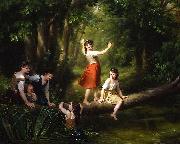Großhandels China Öl Gemälde & Rahmt Ein |
|||||||||||

|
|||||||||||
|
|
|
||||||||||||||
|
Fritz Zuber-Buhler
was a Swiss painter integrant of the style Academic Classicism, born in 1822 at Le Locle in Switzerland and died November 23, 1896. At sixteen years old he moved to Paris, France where found his first teacher Louis Grosclaude. Later he studied at the École des Beaux-Arts and then refined his technical skills with François-Édouard Picot, who followed the same lineage of contemporaneous artists such as Leon Perrault, Bouguereau, Alexandre Cabanel and many others. Afterwards he spent some time in Italy searching for inspiration and raise the quality of his art. Then, returning to Paris, he made his debut at the Salon in 1850 exhibiting alongside oil paintings, drawings, pastels and watercolors. His painting Innocence shows his romantic view of the peasant childhood and their environments, expressing nature, softness and intense details. Also his works were drawn by popular themes at that period like mythology, religion and requested portraits. Zuber-Buhler produced exhibitions in the United States, comprising at the Pennsylvania Academy of the Fine Arts and achieved great admiration as a classic academic painter. |
||||||||||||||
|
|
||||||||||||||
|
||||||||||||||
|
|
||||||||||||||
| Fritz Zuber-Buhler
was a Swiss painter integrant of the style Academic Classicism, born in 1822 at Le Locle in Switzerland and died November 23, 1896. At sixteen years old he moved to Paris, France where found his first teacher Louis Grosclaude. Later he studied at the École des Beaux-Arts and then refined his technical skills with François-Édouard Picot, who followed the same lineage of contemporaneous artists such as Leon Perrault, Bouguereau, Alexandre Cabanel and many others. Afterwards he spent some time in Italy searching for inspiration and raise the quality of his art. Then, returning to Paris, he made his debut at the Salon in 1850 exhibiting alongside oil paintings, drawings, pastels and watercolors. His painting Innocence shows his romantic view of the peasant childhood and their environments, expressing nature, softness and intense details. Also his works were drawn by popular themes at that period like mythology, religion and requested portraits. Zuber-Buhler produced exhibitions in the United States, comprising at the Pennsylvania Academy of the Fine Arts and achieved great admiration as a classic academic painter. 19th century oil painting from Movement Academic Classicism. |
||||||||||||||
|
Related Paintings to Fritz Zuber-Buhler :. |
||||||||||||||
|
|
||||||||||||||
|
|
||||||||||||||
|
KONTAKTIEREN Sie UNS |







